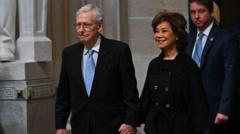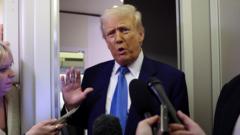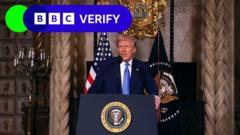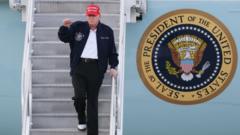Zelensky's remarks underscore the critical nature of U.S. backing as Ukraine faces ongoing threats from Russia, with European officials seeking clarity on future diplomatic efforts.
Zelensky: Ukraine's Survival Hinges on U.S. Support

Zelensky: Ukraine's Survival Hinges on U.S. Support
Ukrainian President Volodymyr Zelensky emphasizes the vital role of U.S. support in Ukraine's struggle against Russia during the Munich Security Conference amid concerns over U.S. strategy.
In a significant address during the ongoing Munich Security Conference, Ukrainian President Volodymyr Zelensky stated that the survival of Ukraine amidst its ongoing conflict with Russia is highly contingent upon continued support from the United States. In an excerpt from his upcoming NBC interview, Zelensky expressed concerns about Ukraine's prospects without U.S. assistance, claiming, "Probably it will be very, very, very difficult. And of course, in all the difficult situations, you have a chance. But we will have low chance — low chance to survive without support of the United States."
The statements from Zelensky emerged on the opening day of the Munich Security Conference, which gathered numerous anxious diplomats and officials from Europe who were hoping for a clear vision from the U.S. on how to navigate peace negotiations with Russia. However, Vice President JD Vance's speech fell short of expectations, addressing the Ukraine situation only briefly and failing to present any concrete plan for diplomatic engagement or a post-war Europe.
In the lead-up to the conference, remarks from Trump's newly appointed Defense Secretary, Pete Hegseth, raised eyebrows amongst NATO and Ukrainian officials. He suggested that U.S. support would not extend to Ukraine's aspirations to join NATO as part of any peace settlement. Furthermore, he characterized any potential return to Ukraine's pre-2014 borders, when Russia annexed Crimea, as "unrealistic."
Adding to the complexities of U.S.-Ukraine relations, former President Donald Trump has proposed a controversial trade-off: that U.S. aid be exchanged for Ukraine’s access to critical minerals valued at approximately $500 billion. Trump asserted during a recent Fox News appearance that Ukraine had "essentially agreed to do that," indicating a shift in how aid may be negotiated in the future.
The discussions at the conference, coupled with high-stakes dialogue surrounding U.S. support, will likely shape the international community's approach to Ukrainian sovereignty and regional stability moving forward.
The statements from Zelensky emerged on the opening day of the Munich Security Conference, which gathered numerous anxious diplomats and officials from Europe who were hoping for a clear vision from the U.S. on how to navigate peace negotiations with Russia. However, Vice President JD Vance's speech fell short of expectations, addressing the Ukraine situation only briefly and failing to present any concrete plan for diplomatic engagement or a post-war Europe.
In the lead-up to the conference, remarks from Trump's newly appointed Defense Secretary, Pete Hegseth, raised eyebrows amongst NATO and Ukrainian officials. He suggested that U.S. support would not extend to Ukraine's aspirations to join NATO as part of any peace settlement. Furthermore, he characterized any potential return to Ukraine's pre-2014 borders, when Russia annexed Crimea, as "unrealistic."
Adding to the complexities of U.S.-Ukraine relations, former President Donald Trump has proposed a controversial trade-off: that U.S. aid be exchanged for Ukraine’s access to critical minerals valued at approximately $500 billion. Trump asserted during a recent Fox News appearance that Ukraine had "essentially agreed to do that," indicating a shift in how aid may be negotiated in the future.
The discussions at the conference, coupled with high-stakes dialogue surrounding U.S. support, will likely shape the international community's approach to Ukrainian sovereignty and regional stability moving forward.























